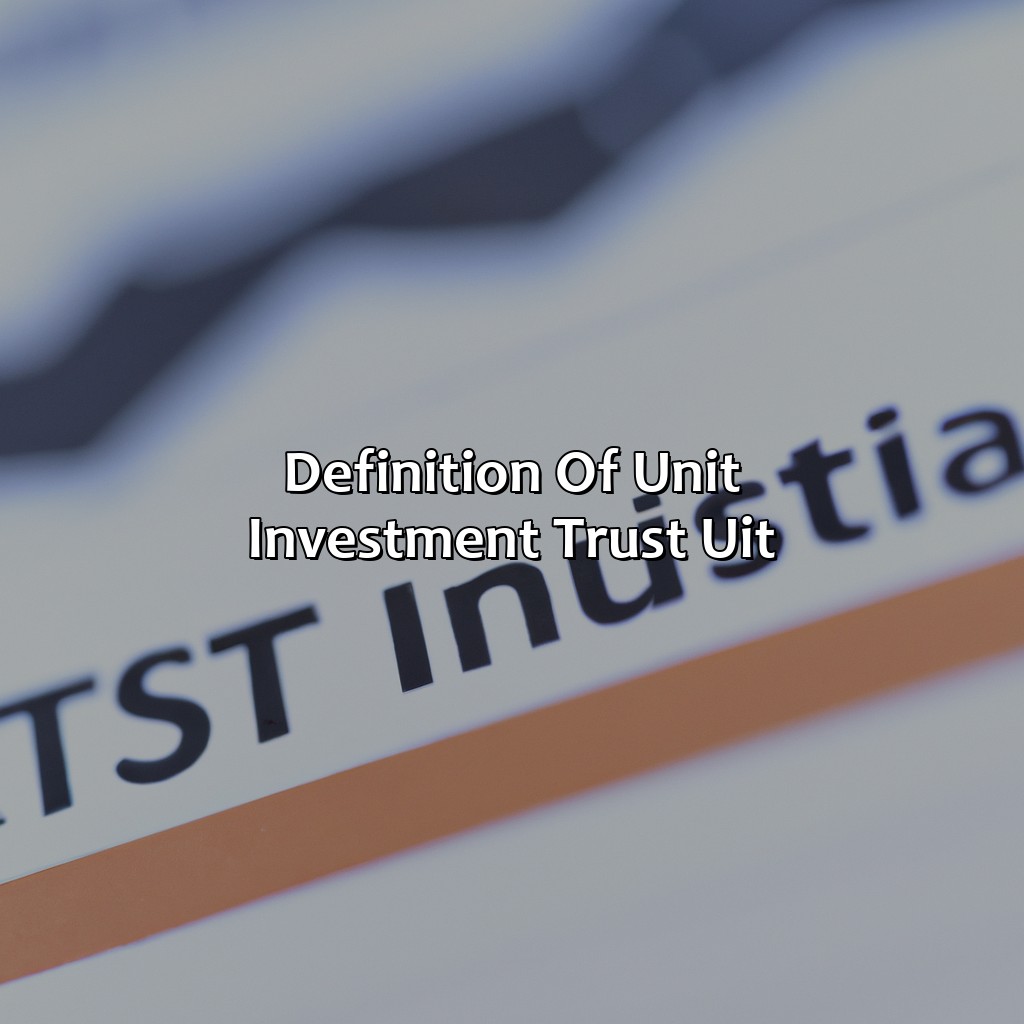What Is A Unit Investment Trust?
Key Takeaway:
- A Unit Investment Trust (UIT) is a type of investment company that pools money from multiple investors to purchase a fixed portfolio of stocks, bonds, or other securities. Each UIT unit represents a proportional share in the portfolio, and investors receive a portion of the income generated by the trust.
- UITs can hold a variety of assets, including stocks, bonds, and real estate investment trusts (REITs). Some UITs are also focused on specific sectors or investment strategies, such as technology or socially responsible investing.
- Investing in UITs can provide diversification benefits, as the fixed portfolio creates a balanced exposure to different asset classes. UITs also offer transparent pricing and a defined investment timeframe, which can make them a suitable choice for long-term investors.
Have you been thinking about diversifying your portfolio with a unit investment trust (UIT)? You’re in the right place to learn the basics of what a UIT is and how it can benefit you. Dive in to discover how a UIT could help you reach your financial goals.
Definition of Unit Investment Trust (UIT)
A Unit Investment Trust (UIT) is a type of investment company that pools money from multiple investors to buy a fixed portfolio of securities. Unlike mutual funds, UITs do not have a professional manager to make investment decisions, and the securities are typically held until maturity. The value of the UIT changes based on the performance of the underlying securities. These securities can be stocks, bonds, or other types of fixed income investments. UITs are known for their transparency, diversification, and low costs.
UITs offer investors several advantages, including the ability to diversify their portfolios across different types of securities. Additionally, because UITs do not have a manager, they tend to have lower expenses and fees compared to mutual funds. UITs also provide investors with regular income in the form of interest or dividends earned on the underlying securities.
One unique aspect of UITs is that they have a fixed maturity date, at which point the securities in the trust are sold, and the proceeds are distributed to investors. This means that UITs are a good investment option for those who prefer a set term for their investments.
Pro Tip: Investors should carefully consider the fees and expenses associated with UITs before investing, as these costs can impact overall returns. It is also important to research and understand the underlying securities in the trust to determine if it aligns with one’s investment goals.

Image credits: retiregenz.com by James Woodhock
Types of assets held by UITs
UITs Assets: A UIT is a type of investment company that pools money from multiple investors to purchase a fixed portfolio of securities. The assets held by UITs are diversified and can include stocks, bonds, and other investment products.
The table below shows the types of assets that are typically held by UITs:
| Asset Type | Description |
|---|---|
| Stocks | Equity ownership in publicly traded companies. |
| Bonds | Debt securities that can provide a fixed income stream. |
| Mutual funds | Pools of various investments, managed by a professional asset management company. |
| ETFs | Exchange-traded funds that track an index or a collection of securities. |
UITs offer investors the opportunity to invest in a diversified portfolio of assets, which can help to reduce risk. Unlike mutual funds, UITs have a fixed portfolio of assets and do not trade securities frequently. This means that investors can be sure of what they are investing in and that there are no hidden surprises in the form of changes to the portfolio without notice.
UITs have been around for over 100 years, with the first trust being created in 1924. The popularity of UITs has grown over the years, and they are now a popular investment vehicle for both institutional and individual investors. The simplicity of UITs has made them a popular choice for novice investors who want to gain exposure to the financial markets without worrying about building or managing a portfolio themselves.
Overall, UITs offer investors a simple and straightforward way to invest in the financial markets. With a fixed portfolio of diversified assets and a long history of success, UITs are an attractive option for those looking to invest in a low-risk, diversified investment product.

Image credits: retiregenz.com by Adam Washington
Benefits of investing in UITs
When considering investment options, one may be curious about the benefits of investing in a Unit Investment Trust (UIT). This type of investment vehicle offers a variety of advantages including diversification, professional management, transparency, fixed income, and relatively low fees.
- Diversification: UITs offer diversification by investing in a portfolio of securities that may include different asset classes, sectors, and geographic regions. This can mitigate risk and provide potential for long-term growth.
- Professional Management: UITs are professionally managed by experienced portfolio managers who aim to achieve the investment objectives of the trust.
- Transparency: UITs disclose their investment holdings and strategies regularly, providing investors with transparency and clarity.
- Fixed Income: Some UITs focus on investing in fixed income securities, providing predictable income streams and consistent returns for investors.
- Relatively Low Fees: UITs generally have lower fees compared to other investment options such as mutual funds and ETFs, which may result in higher returns for investors.
It’s important to note that some UITs have specific investment objectives and may not be suitable for all investors. However, for those seeking diversification, professional management, transparency, fixed income, and relatively low fees, UITs could be a beneficial investment option.
Investors should carefully evaluate the investment objectives, risks, and fees associated with a particular UIT before investing. Additionally, consulting with a financial advisor can help identify which UITs align with an investor’s individual goals and risk tolerance.

Image credits: retiregenz.com by David Duncun
Risks associated with investing in UITs
UITs and Potential Risks for Investors:
Unit Investment Trusts (UITs) are an increasingly popular way to invest in a diverse range of securities. However, there are certain risks associated with investing in UITs that investors should be aware of.
Here are the risks associated with investing in UITs:
- Possible loss of initial investment
- Limited liquidity due to an unchanging portfolio of investments
- Not diversifying enough across industries or sectors
- Investing during the end of a UIT’s life cycle
- The potential for lack of transparency in prospectus disclosures
- Higher fees than other comparable investments
It is essential to note that investing in UITs can have unique benefits, like diversification and simplified investment management, but investors should be aware of the potential risks.
In recent years, UITs have increased in popularity due to their potentially high yields. However, investors should be mindful of the high fees, lack of transparency in disclosures, and limited liquidity that often come with these investments.
History tells us that UITs have had mixed performance; depending on the factors at play. For instance, in the late 90s, the telecom industry-speculative boom led to many UITs investing in such companies, resulting in their ultimate failure. Therefore, it is crucial to understand the current market conditions, the investment’s historical performance, and the associated risks before investing in a UIT.

Image credits: retiregenz.com by David Duncun
How to invest in UITs
Investing in a Unit Investment Trust (UIT) can be done by purchasing units of pooled investment securities like stocks and bonds. To invest in a UIT, an investor should research the trust’s investment objective and portfolio to determine if it aligns with their investment goals. Investors can purchase units through brokers or financial institutions. Fees, including sales charges or management fees, should be considered when investing in a UIT. Additionally, investors should monitor their UIT investments regularly to ensure they remain aligned with their investment objectives.
A key consideration before investing in a UIT is the trust’s investment objective. Investors should understand the type of securities the trust invests in, such as stocks or bonds, to determine if the UIT aligns with their investment goals. After researching and selecting a suitable investment trust, investors can then purchase units through a broker or financial institution. It’s essential to consider fees, including sales charges or management fees, as these can impact the overall investment return. It’s also crucial to regularly monitor UIT investments to ensure they align with the investment objectives.
Investors should note that a UIT is a “buy and hold” investment strategy as the trust has a fixed portfolio and no active management. As a result, UITs tend to be less costly than mutual funds or exchange-traded funds (ETFs). However, UITs may have more limited liquidity than other investment types, and investors may incur charges if they sell their units early. Therefore, investors should ensure that they understand the trust’s investment objectives and the potential risks associated with investing in a UIT before investing.
Pro Tip: Before investing in a UIT, it’s crucial to read the trust’s prospectus thoroughly and consult with a financial professional to determine if the investment aligns with your financial goals and risk tolerance.

Image credits: retiregenz.com by Joel Woodhock
Some Facts About Unit Investment Trusts:
- ✅ A Unit Investment Trust (UIT) is a type of investment company that pools money from investors to purchase a fixed portfolio of stocks or bonds. (Source: Investopedia)
- ✅ UITs have a set maturity date and investors can redeem their units at net asset value (NAV) at any time before maturity. (Source: U.S. Securities and Exchange Commission)
- ✅ Unlike mutual funds, UITs are not actively managed and hold their investments until the maturity date. (Source: The Balance)
- ✅ UITs typically have lower fees than mutual funds or exchange-traded funds (ETFs). (Source: Motley Fool)
- ✅ UITs can be a good investment choice for investors seeking diversification and a fixed portfolio of securities with a defined investment horizon. (Source: Forbes)
FAQs about What Is A Unit Investment Trust?
What is a unit investment trust?
A unit investment trust (UIT) is a type of investment vehicle that pools money from multiple investors to purchase a fixed portfolio of securities. These securities are typically held for a set period of time and can include stocks, bonds, or other types of assets.
How does a unit investment trust work?
When you invest in a UIT, you are buying units or shares of the trust. The trust then uses the money collected to purchase a predetermined set of securities. The value of your investment in the trust is based on the performance of that portfolio of securities.
What are the benefits of investing in a unit investment trust?
A UIT offers several benefits, including diversification, professional management, and a fixed portfolio of securities that can help reduce risk. Additionally, investors can benefit from predictable income from the trust’s portfolio.
Are there any drawbacks to investing in a unit investment trust?
One potential drawback of investing in a UIT is that the portfolio is fixed and cannot be changed by the manager. This means that if market conditions change, the portfolio may not be able to adapt quickly. Additionally, UITs can have high fees and expenses, which can eat into your returns.
How do I invest in a unit investment trust?
You can purchase units of a UIT through a brokerage firm, like you would any other investment. However, it’s important to do your research and understand the fees and expenses associated with the trust.
What is the difference between a unit investment trust and a mutual fund?
UITs and mutual funds are both types of investment vehicles that pool money from multiple investors to invest in a portfolio of securities. However, UITs typically have a fixed portfolio, while mutual funds can adjust their holdings based on market conditions. Additionally, UITs are generally less actively managed than mutual funds and can have higher fees and expenses.
